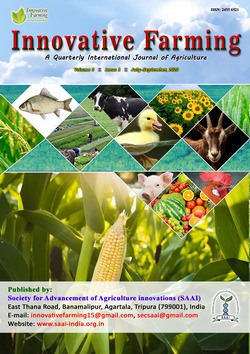
Cluster Promotion Programme (CPP), A Novel Method for the Upliftment of Socio-Economic Conditions of Schedule Caste and Schedule Tribe Farming Community
K.P. Kiran Kumar*
Regional Sericultural Research Station, Central Silk Board (CSB), Ananthapur-515 001, Andhra Pradesh, INDIA
P. Sudhakar
Regional Sericultural Research Station, Central Silk Board (CSB), Ananthapur-515 001, Andhra Pradesh, INDIA
B. Vijaya Naidu
Regional Sericultural Research Station, Central Silk Board (CSB), Ananthapur-515 001, Andhra Pradesh, INDIA
R.S. Teotia
Central Sericultural Research and Training Institute (CSRTI), CSB, Mysore-570 008, Karnataka, INDIA
DOI: NIL
Keywords: Bivoltine Sericulture, Cluster Promotion Programme, Mulberry cultivation, Silkworm rearing
Abstract
Cluster Promotion Programme (CPP) was implemented during 2008-2019 under XI & XII five year plans to generate gradable Bivoltine raw silk and project India as a potential Bivoltine silk producer in the international scenario. Kalyandurg has become one of the clusters selected for implementing the CPP out of 17 clusters choose to implement CPP in Andhra Pradesh. CPP was implemented in Kalyandurg during 2010-19 and distributed 28.51 lakh of DFLs against the target of 24.75 lakh with a significant achievement of 121.44%. During the CPP implemented period, 26.80 lakh DFLs were harvested, produced 1397.7 MT of cocoons and contributed in generation of 275.85 MT graded Bivoltine raw silk. Cocoon yield/ 100 DFLs was enhanced from 45 kg (benchmark level) to 68.11 kg and fletched Rs. 395 average market price per kg cocoons. Further, as a part of cluster promotion programme, several scheduled caste and scheduled tribe farmers were approached and encouraged to take up Bivoltine sericulture to uplift their socio economic conditions. Chovitivanka Thanda (C. V. Thanda) of Kambaduru mandal under Kalyandurg Cluster, Anantapur District, Andhra Pradesh, where only 50 Sugali (ST) families live in and they were approached and made efforts to take up sericulture. Smt. Alivalamma, G. Rama Naik and Ch. Rama Naik are Scheduled Tribe farmers and suffered with losses due to the cultivation of various agricultural, vegetable and horticultural crops. They were struggling for their survival and they were planning to go to urban areas to pull the days as daily waged labourers. Under this situation, CPP was implemented by giving subsidies in all aspects of sericulture in the year 2017. They established gardens, rearing houses, infrastructure facilities and harvested yield of more than 80 Kgs/100 DFLs and earned more than Rs. 1 lakh in the first crop itself in all cases and their life has been transformed, uplifted their socio-economic conditions and brought glitters in their lives. They became role models for the other farmers, 15 new farmers have come forward and established sericulture from the same village and they are also in the same path of profitable sericulture. The village so called C.V. Thanda have become Seri Thanda with the development of Bivoltine sericulture under CPP.
Downloads
not found
